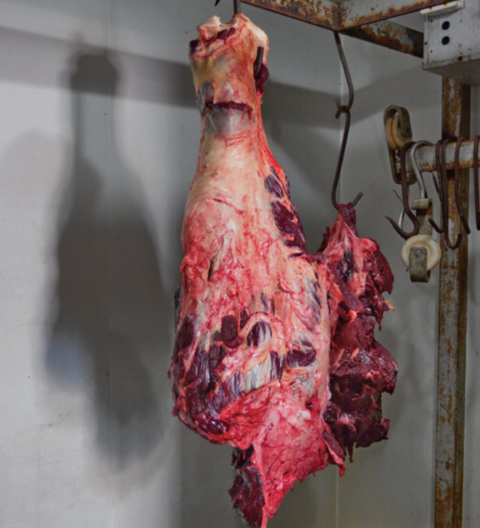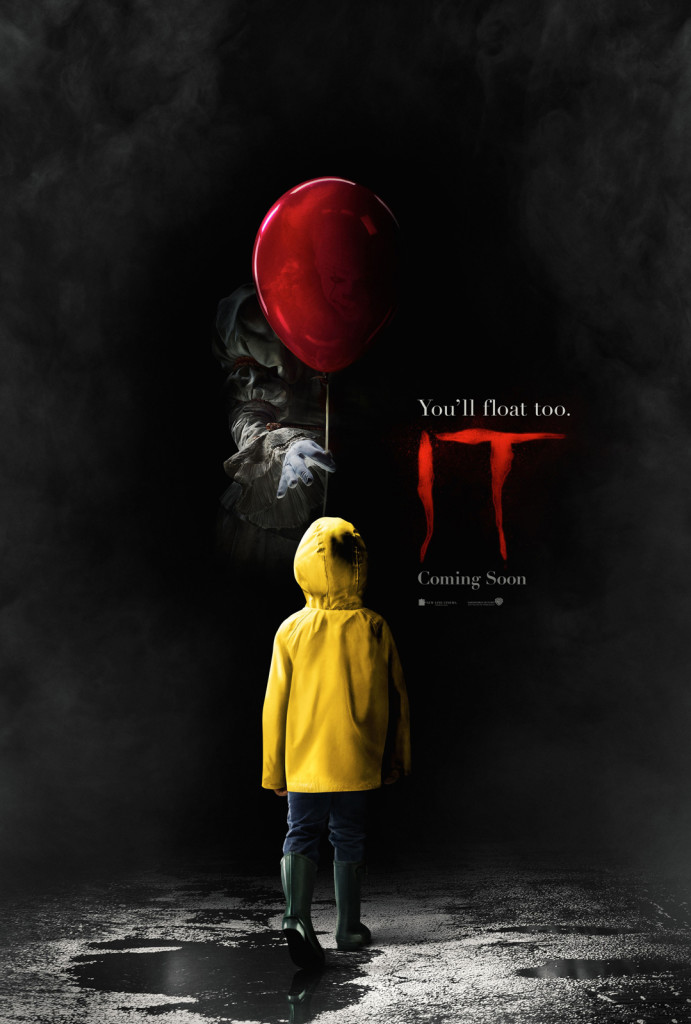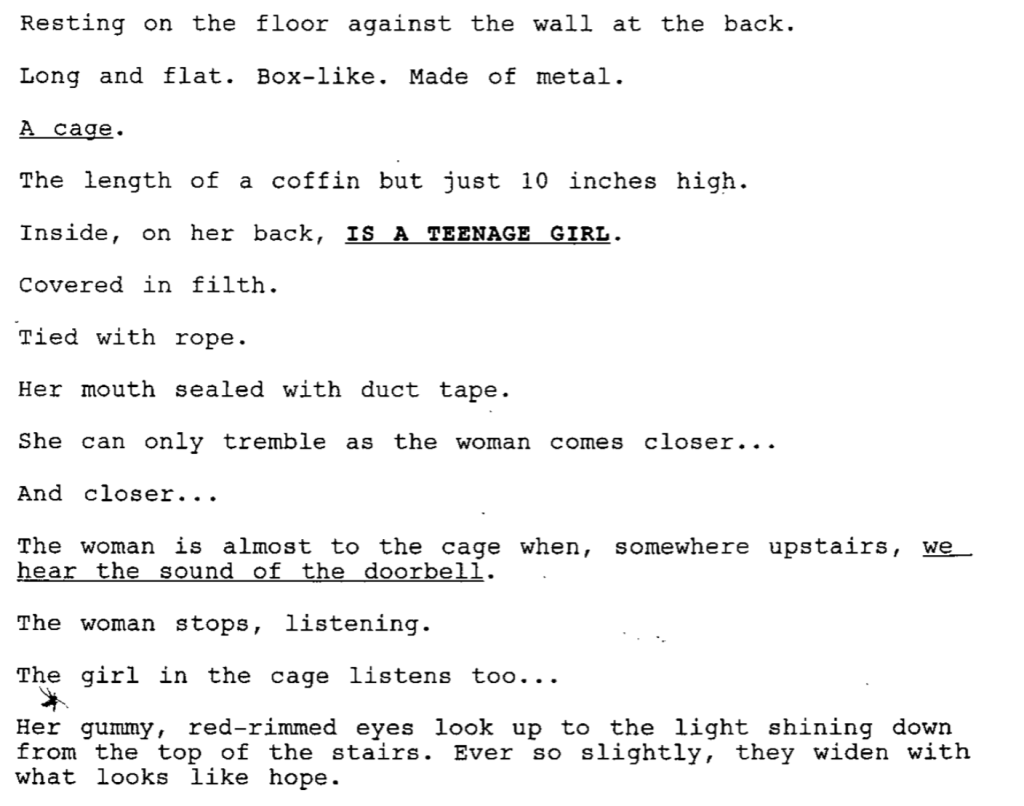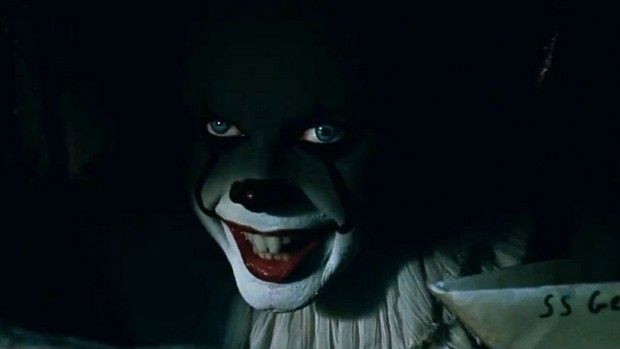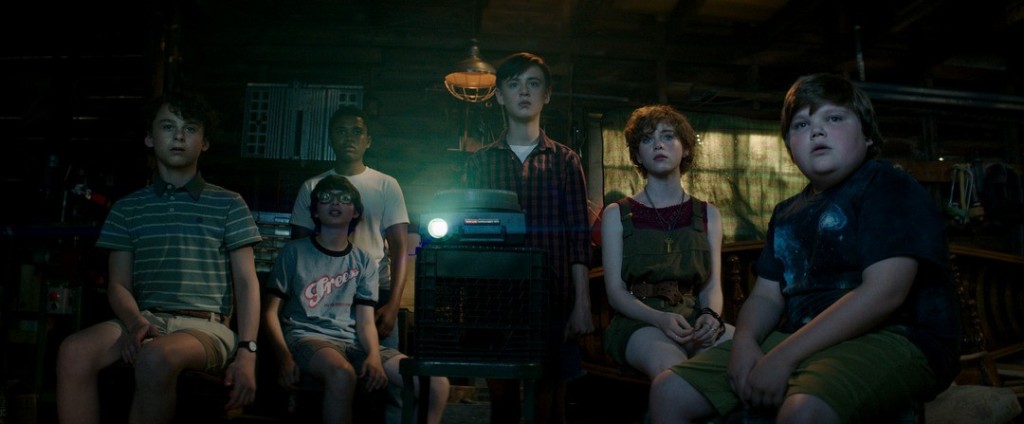Holy shit, guys.
HOLY. SHIT.
Okay, here’s the deal. I read this script this morning with the plan to get a review up quickly afterwards.
All of that changed when it became apparent that this was the best amateur script I’ve read all year. Guys, this script is really REALLY good. Like, really good. And this writer deserves a lot more than a quickly written review.
So here’s what we’re gonna do. I want you to read this script over the weekend. I’ll then give it a proper review on Monday and we can all discuss it.
Screenplay Link: MEAT
For those who missed last weekend’s Amateur Offerings, the script is titled “MEAT” and here’s Logan Martin’s submission details.
Premise: A misanthropic man notices bizarre changes in himself, his wife, and the animals inhabiting the territory around their homestead as they attempt to survive self-imposed isolation.
Why You Should Read: After moving from North Dakota post-college at the end of 2016, I started to write scripts in my spare time and fell in love with it. My first screenplay placed in the top 20% of the 2017 Nicholl fellowship, and as of now I’ve “finished” five features and am working on my sixth. I aim to create original, meaningful stories, but even more so focus on presenting them in a unique way. MEAT has been compared to The Witch by readers due to its low budget, as well as its setting and tone. It’s an unconventional horror story that poses a moral question without appearing pretentious.
Congrats to Logan for getting my first amateur IMPRESSIVE rating of the year!!!
Has it happened yet?
The It backlash?
I’ve found that each year, the post-success backlash leash gets shorter and shorter. So has it happened yet for It?
I don’t know about you folks. But I think this movie is great. It’s the kind of movie that reminds you of why we go to the movies. Not just to see a bunch of pretty pixels clash, but to meet people, get to know people, have an experience with them, see them overcome things.
I love this message that we’re stronger together than we are apart. As I’ve told you guys before, I believe the best themes are the most universal. “It” proves that.
So all you haterz? Just stop.
Now that we’ve got that out of the way, let’s talk script changes. “It” endured a long development process that saw writers and directors come and go. At one point True Detective director Cary Fukunaga was going to helm the project, and that’s what got the world excited in the first place. The guy who did that fucked up show was in charge of Stephen King’s most fucked up story? Sign me up!
But things got delayed, schedules got screwed up, and away Cary went. So one of the big questions has been, what was Fukunaga planning to do with the property? What was his (and co-writer Chase Palmer’s) script like? Lucky for you guys, I’ve read it. And I’m going to give you the lowdown.
Since this is a screenwriting site, I’m going to focus on the screenwriting changes. And to that I’ll say this: The script didn’t change that much. However, there are a lot of little screenwriting changes that are relevant to geeks like you and me. Are you ready to check them out? Good. Jump on my homemade raft. Don’t worry. You’ll float too.
The first big change I noticed happened in the first scene of Georgie making a paper boat with his brother, floating it down the street, and getting eaten by Pennywise in the gutter. In this early draft, the conversation between Georgie and Pennywise takes only a SINGLE PAGE – just one page of dialogue – before Pennywise kills him.
Gary Dauberman extended that scene waaaaay longer. The onscreen conversation goes on for 3-4 minutes. And that was a much better choice. Whenever you have a great scene setup with a potential dangerous outcome, that’s screenplay gold right there. Those are the situations we wish we could have in every scene. So when you have that, you milk it for as long as possible. And that’s what Dauberman did. And the scene was all the better for it.
The next change I noticed was Stan’s first scare scene. Stan is the young Jewish kid getting ready for his first Bar Mitzvah. He’s going to finally “become a man.” In the movie, his scary scene occurs when he goes into his dad’s library and the weird warped painting dude comes out of the picture and stalks him.
In Fukunaga and Palmer’s draft, Stan goes to the bathroom, and an eerie beautiful naked woman rises from the toilet next to him, asking if he’s ready to become a man. Her lower half still blocked, she tempts Stan with seeing more of her, finally rising up to show that her entire lower half is decrepit and rotting.
This was an interesting dilemma, which of these two scenes to go with, because Fukunaga and Palmer’s scene is more character-based. The woman represents the other side of Stan’s impending manhood. It plays to his eventual transformation. But the painting scene, while having zero thematic connection to anything in the movie, is just scarier.
As screenwriters, we face this dilemma all the time. Do we go with the more entertaining choice or the more relevant choice? It’s never an easy answer and you have to weigh both sides carefully and make the decision you think is best for the script. They probably made the best choice to go with the painting scene.
Next up was the absence, in this early draft, of the New Kids on the Block inside jokes between Beverly and Ben. These jokes played interestingly in my theater and I’m not sure what audiences thought of them as a whole, but here’s why I think Dauberman’s choice to include Donny, Joey, and Marky Mark wins again. In order to convey a bond between characters, you need specificity. You need something beyond “I like you and you like me.” The specificity of that New Kids connection made Beverly and Ben’s friendship more real.
Another change in this draft actually addresses a complaint I brought up in my review of the film. It was there that I questioned if Ben would really follow a trail of spooky flaming eggs into the basement. The point of the scene was to set up the tragedy in Derry 30 years earlier during the Easter Day parade that killed 100 people in a factory fire.
In Fukunaga and Palmer’s draft, this scene doesn’t happen. Instead, the famous fire is set up via the bully character, Henry Bowers. Bowers, after searching for Ben, ends up at the old factory, where he and his cronies search around. They start seeing scary ass shit, including Pennywise.
The reason I think this scene was cut was because we had a ton of main characters to cover. This is the issue you run into whenever you write ensemble scripts (“protagonist as a group”). You have to build depth into each and every character, which takes time. They probably decided that giving a full 5 minutes to the bully character wasn’t time well spent. That as much time as possible should be dedicated to the core group of boys. And so Henry’s factory scene was cut and the Easter spooky scene was shifted over to Ben. Even though it didn’t make sense!
A problem in both drafts seems to be Mike Hanlon (the lone black kid in the group). He has so little to do in the movie that you’re surprised when he actually says anything at all. He gets a little more time here, but not much.
There’s a scene where Mike’s dad tells him about his past and we flash back and we see the KKK and his dad says he saw Pennywise. But obviously none of it made it into the movie. Usually when you’re cutting scenes like that, it’s because you don’t have any confidence in the character.
But there may be a bigger reason, one that more recent readers of It can correct me on if I’m wrong. I seem to remember some HARDCORE exploration of racism in the book. King wrote this back in the 80s, when racism was more rampant. And that sort of defined Mike’s character. I don’t believe today’s audiences wanted to go that deep and the writers recognized that. Which, unfortunately, didn’t leave much for Mike to do but shoot sheep.
Another scene in Fukunaga and Palmer’s script has the kids going to the fireworks show together. Scenes like this are important in group friendship movies because they help solidify the bond in the audience’s eyes. As a writer, you can’t just assume the audience will buy the friendship. You have to SHOW it. However, the scene was erased and I’m guessing it’s because they felt the naked swimming scene was so strong and did such a good job of selling the bonding of these kids that they didn’t need an extra scene to do it.
Aspiring screenwriters everywhere: This is what big time screenwriters get paid for. The people who can do in one scene what it takes others to do in two or three or four – they’re the ones who are going to get the job. Screenwriting is about efficiency. So you have to be able to do a lot inside little spurts of time.
Another big change is how the kids end up in the Neibolt Street haunted house. In the film, they CHOOSE to go in there. In Fukunaga and Palmer’s draft, they get backed in there by Henry Bowers and his goons.
This is the most interesting “It” draft-war debate, in my opinion. Motivating characters to willingly walk towards danger is always tough. So Fukunaga and Palmer made the smart choice of forcing the characters into a place they didn’t want to be in.
On the surface, this seems like the better choice. In the movie, when the kids are in the house, you’re constantly asking, “What are they doing here??” It didn’t make a whole lot of sense.
But I can understand Dauberman’s reasoning for doing so. It makes the characters a lot more active if they CHOOSE to enter the house. It makes them braver. Dauberman just needed a reason to get them there, so he came up with this whole plotline where all the sewers lined up under the house and, therefore, that’s the most likely place Bill’s missing brother Georgie would be.
In the end, I’m not sure which was the better choice. I like the characters willingly going to and having a purpose to be in the house. But had they been pushed into the house, you wouldn’t have had the problem you had in the movie, which was the characters standing around waiting to be scared. They would’ve been trying to escape the bully and move through the house more quickly.
There were other changes here and there. There’s a flashback 1800s Pennywise Old West scene. There’s more bully stuff. But both scripts are working off the same source material so the stories never stray too far from one another. It’s always interesting, though, observing the different choices a writer makes, what they think is important and unimportant.
I was watching some promotional material for the upcoming “Disaster Artist,” James Franco’s adaptation of the making of the worst movie ever made, The Room. Franco asks the weirdo real-life star of the infamous film, Tommy Wiseau, what part of James’s movie Tommy liked best. Tommy replied, “The way the pool was lit.” Franco laughed, because the pool was like 3 seconds of the entire movie and didn’t have anything to do with anything. It’s an extreme example of how every artist prioritizes things differently.
But in the case of “It,” I honestly don’t think any of these changes mattered. It would’ve been a good movie either way. The source material was too damn strong.
Genre: Drama/Horror?
Premise: A man who’s lived his entire adult life in a mental institution obsessing over the beautiful niece he’s never met, finally decides to leave and find her.
About: Ted Foulke, aka Wentworth Miller, became a tour de force on the screenwriting circuit back in 2010, selling two scripts, Stoker and The Disappointments Room, back to back, winning over Hollywood with his sophisticated, intelligent, dark voice. Stoker became a huge project, attracting visionary South Korean director Chan-wook Park (Oldboy, Lady Vengeance, The Handmaiden). But something fell through the cracks during the adaptation, and the movie performed badly at the box office, disappearing out of the public eye almost immediately. The Disappointments Room, the more commercial of the two projects, didn’t fare much better, getting caught in the Relativity meltdown, ultimately dumped into the VOD market without any promotion. Today’s script, “Uncle Charlie,” is a prequel to Stoker.
Writer: Ted Foulke (Wentworth Miller)
Details: 119 pages
There was a good one year period there where Wentworth Miller was considered the best up-and-coming screenwriter in Hollywood. He wrote two specs, Stoker and The Disappointments Room, that wowed the shit out of anybody who read them. There was a depth and attention to detail that was absent from all the vapid empty scritps selling at the time, and just an interesting dark voice at the center of it all, giving us stories we’d never quite seen before.
But then the movies came out and they were… ignored. And I have a theory on that. Films that fall under the horror tag but don’t contain supernatural elements struggle to find an audience. There are exceptions to this. If the scripts have a big flashy hook (Get Out or The Purge), they can work. But if you have something like Stoker, where it isn’t 100% clear when you watch the trailer what genre we’re in or what kind of story we’re watching, that’s going to keep people out of the theater.
And the problem with Miller is that he actually makes his scripts intelligent. Which, funnily enough, alienates audiences even more. If he could just dumb it down a little (throw a killer clown in there), I’m sure he’d be one of the biggest horror screenwriters in town. I’d love to see a Miller supernatural horror film. I think it would be awesome. But for right now, we have his prequel to Stoker, Uncle Charlie. Let’s check it out.
“Uncle Charlie” starts out explaining that this a prequel to Stoker, and therefore if you don’t know that film, you won’t be able to appreciate this one. That’s a tricky choice because I don’t remember much about Stoker. But I do remember that a teenage girl named India loses her father and she and her mother move in with his mysterious brother, Uncle Charlie.
What we come to know later in the film is that Uncle Charlie has spent nearly his entire life in a mental institution. And that’s where we find Charlie here, a year before the events of Stoker, pulling off his best One Flew Over the Cuckoo’s Nest impression, wrecking havoc on his version of Miss. Ratchet, Doctor Walker. Charlie could’ve left this place years ago. He was actually able to leave the day he turned 18. But he CHOOSES to stay here.
When Charlie’s not making Doctor Walker’s life miserable, he’s drawing pictures of India. This part I didn’t understand. As far as I can tell, he’s never met India. So I don’t know how he can draw her so well. Maybe he’s seen pictures of her?
Meanwhile, back at the farm, India divides her time between going to school and taking piano lessons with her new teacher, Miss Price. Miss Price is an excellent teacher minus the fact that she moves from town to town, torturing and killing her students. In fact, she’s got one locked up in a cage in her basement right now. One that will have to be “taken care of” in order to make room for an unsuspecting India.
Over at the nut house, Uncle Charlie finally decides to flee the coup, illustriously turning Dr. Walker into a vegetable before doing so. And the first place he goes is India’s town. He’s got to meet his obsession, of course. He gets there right when India goes to her first high school dance. And let’s just say he “takes care” of India’s date so that she’s free.
That night, after the dance, India runs into Miss Price, who “happens” to be driving by, and who offers India a ride home. But, oh yes, she wants to stop by her house first to “show India something.” We all know where this is going. However, what Miss Price doesn’t know is that India’s got a new guardian angel. A very dangerous new guardian angel.
If yesterday’s prose annoyed you and you prefer a more classic writing style, this script is for you. Miller’s prose is simple, efficient, descriptive, and flows better than any script you’ll read this year. It’s what makes his scripts so easy to read, which, in this case, was necessary, since the story itself doesn’t stack up to his previous entries.
The problem is that Miller handcuffs himself with the prequel treatment. Prequels never work. Ever. I’m not sure why writers like them. They’re one giant narrative fork in the road where every path you take leads to a dead end. George Lucas painfully found this out when he started writing Episode 1. Wait, I have to keep two of my biggest characters, Obi-Wan Kenobi and R2-D2, apart for 99% of the trilogy?
Uncle Charlie follows two separate storylines, Uncle Charlie’s and India’s, and while these storylines want to find each other, or, at the very least, intersect, they can’t. Because in the next movie, Uncle Charlie and India meet for the first time. Miller tries. He tries his darndest, even cheats to give us that crossover moment. But the storylines never overlap in any meaningful way, which leaves the reader wondering, what was the point?
Another issue is that the script’s best plot thread, the serial killer piano teacher, is operating at a net negative. We know Miss Price can’t kill India because India appears in the next movie. And if you don’t have the uncertainty of whether India will succumb to this monster or not, where is the suspense? These movies only work if they’re suspenseful. So if your splashiest storyline can’t mine that tool, what’s the point?
You also run into issues like, what are the chances that so many killers are randomly intersecting in life? What are the chances that this girl has a serial killer uncle AND a serial killer piano teacher? Audiences start asking themselves these questions. And the answers are what break the suspension of disbelief.
“Uncle Charlie” also reminded me of a problem I had with Stoker. India isn’t an interesting character. I’ve told you guys this before. Be careful about making your main character a sociopath, eliminating all feeling and personality from them. These people walk around emotionless for 100 minutes, leaving the story feeling empty and cold whenever we’re around them. Miller tries to balance this out with the wackier more expressive Uncle Charlie, and it works to an extent. Uncle Charlie is a compelling character to watch. But like I said, the narrative is so handcuffed by its inability to intersect, it ultimately doesn’t matter.
“Uncle Charlie” is a fun and easy read for those who like reading scripts. But there’s neither a hook or a plot here that necessitates it becoming a movie. If Miller were to ever pursue this, it’d be in his best interest to eliminate the India side of the story and watch Uncle Charlie go off on some adventure. There are plenty of fun threads you could find there.
Old School Scriptshadow Script link: Uncle Charlie
[ ] What the hell did I just read?
[x] wasn’t for me
[ ] worth the read
[ ] impressive
[ ] genius
What I learned: Prose is simplicity. Miller is known for having some of the best prose in the business. But note how his description usually stays between 1-3 lines long. Note how he doesn’t use SAT words. Note how a lot of his prose breaks down to short fifth-grade level sentence structure. “Uncle Charlie” is right up there for you to download and see for yourself. A lot of beginner writers would do well to study it.
Say whaaaaat? Is this script actually better than the origin film of the franchise it’s joining?
Genre: Action/Thriller
Premise: A young girl with a proclivity for killing is recruited by a black ops government operation to be one of their primary assassins. But when she pisses off a group of fellow assassins, all hell breaks loose.
About: Shay Hatten burst onto the scene last year. The 22 year old, having just graduated from the underrated film school down at Loyola Marymount, made the Black List with his partially true depiction of Stephen King directing his first film, Maximum Overdrive. Hatten wasn’t done yet. He then wrote this script, which caught the attention of the hottest assassin franchise on the block, John Wick. The producers decided that Ballerina would be their first expansion of the John Wick universe. And so it came to be!
Writer: Shay Hatten
Details: 98 pages (undated)
The biggest spec trend by far at the moment is the Female John Wick trend. These juicy spec patties are selling with a side of fries at your local studio lot. Today it’s time for the Rolls Royce of this trend to make its debut on Scriptshadow – I’m talkin bout Ballerina. I mixed that car metaphor because this script so impressed the John Wick people, they’re actually integrating it into their John Wick universe! How can it get any more Female John Wick than that?
Not long ago, I reviewed Hatten’s breakthrough script, Maximum King, a project that was probably rushed into pre-production the second this weekend’s box office receipts came in. I didn’t love Maximum King. But Hatten can definitely write. He’s got a relentless energy to his prose and narrative, which means very little downtime for the reader. Which is not only the preferred mode for spec script writing, but an ideal mode for a spec like this. Are you as curious as I am with how he did? Then embrace the first position dammit, and straighten out your fucking tutu.
Rooney Brown (I wonder who Hatten envisions playing his lead) executes her first kill at age 6. Her father was in deep with some bad people, those people came to their house, and a crafty Rooney barreled into the killer’s legs once he reached the top of the stairs, sending him toppling down and cracking his neck.
Ever since then, the government’s been keeping an eye on Rooney, who uses the orphanage she’s sent to as her own personal training ground, splitting her time between beating up other kids and doing lots of one-armed push-ups.
Once she hits 18, Rooney is recruited by this black ops government dude named Berkowitz to be an assassin. Rooney doesn’t have a whole lot of direction in her life and she is good at beating the shit out of dudes much bigger than her, so why not?
She takes to killing easily, comfortable in the fact that she’s getting rid of bad dudes – dictators and the like. But then a couple of things change. Rooney falls in love and marries Tom. And the dudes she’s asked to kill aren’t always that evil anymore. It seems like she’s starting to kill only “kind of bad” dudes.
Rooney plans to get out. But not before this final job. While she’s poised to snipe some dude in a passing train, somebody else – another assassin! – snipes her! Injured, Rooney snipes back, killing the girl, and later Berkowitz admits that there’s a shady organization that sometimes kills his killers. Well that would’ve been nice to know ahead of time, Rooney points out.
What Rooney doesn’t know is that she’s just enacted the Defcon 5 protocol of an entire town full of killers. That’s right. There’s a place in the Swiss Alps called Sunnyvale that is made up entirely of killers, and they’ve been killing for over 500 years! Rooney just killed the leader’s daughter. Which means they want to get even. Rooney realizes that the only way she’s going to stop that is if she goes there first — and kills every single person in town.
Initial impressions? If Hatten keeps improving at this rate, he’s going to be one of the top 10 script doctors in Hollywood by the end of next year.
You know who he reminds me of? He’s kind of like Brian Duffield meets Max Landis. He’s got the relentless steamroll-the-page energy of Landis, peppered with some of that self-aware Duffield prose. Also, with this script, he’s starting to embrace character development. Watch out, Hollywood.
My issue with these scripts is always the same. The repetitive nature of the genre leads to boringness. There are only so many ways you can describe your assassin dodging a punch, shooting an enemy in the face, or threatening a baddie’s family unless they, “tell me what I need to know!”
As a result, these scripts tend to peter out by page 40. How do you avoid that? Well, Hatten’s crafted a solid blueprint.
You gotta make us care about the main character somehow. This is what’s going to pay all your dividends later. If you don’t pay attention to this part, your hero is going to feel generic. And audiences aren’t emotionally invested in whether generic soulless people get hurt or not.
You can achieve this “care” in one of two ways. The advanced way or the beginner way. Both ways work. One just takes more time.
The advanced way is to concoct a single scene that makes us fall in love with a character. The classic example of this is the opening scene of Indiana Jones. Indiana displays several things that make audiences fall in love with characters – intelligence, perseverance, and cleverness. The reason this is “advanced” is because it’s hard to make people fall in love with a character in 5-8 minutes. There aren’t many writers who can pull it off.
The beginner way is time. Dedicate a large segment of your first act getting to know your main character through their everyday life. Just the act of spending a lot of time with someone draws us closer to them and makes us care about them (no different from how we become close to people in real life).
Ballerina takes this route. We see Rooney when she’s a kid, as she grows up in an orphanage, as she’s recruited, when she falls in love, through a couple of assassinations – then, and only then, does the shit hit the fan. This way, when she’s going through scene number six of repetitive actions like, “…she kicks the cheese-maker in the face and jams a butter knife through his throat,” we still care, because we care about her.
The other way to keep these scripts interesting is to be unexpected. You have to make unexpected things happen in the micro and the macro. And when I say “unexpected,” I mean the type of shit that doesn’t USUALLY happen in these movies.
To give you an example of the micro, when Rooney is first attacked by that Sunnyvale assassin, she’s shot in her face. She sees the shot just before it comes so she’s able to pull her head back a little bit. But the bullet still goes through one cheek and out the other. This is unexpected in that, when I usually read these scripts, our hero will dodge the bullet entirely.
On the macro end, we have this Swiss Alps 500 year old Assassins Town. Of course I’ve seen a lot of mythology over the years when it comes to assassins. But I’ve never quite run into that. And this idea of our heroine going to a small town in the Swiss Alps to kill every single person in the town. I definitely haven’t seen that.
Writers are inherently lazy. They want to write the easy scene. I was actually going to review a different script today. It was an older script from a writer who was really big 7 years ago. He sold several specs. And I was curious why he’d disappeared off the face of the screenwriting planet.
So I read his “final” spec of that time. This script DID NOT sell. And that was the last time anyone heard from him. I swear to you, half of the first act was lifted directly from another famous movie. It wasn’t even sort of similar. It was the same series of events, beat for beat. I was appalled at the laziness. But I knew right then: THIS is why this writer isn’t working anymore. When you stop trying, the reader stops caring.
Anyway, I went on a little detour there. But the point I was making was, don’t get lazy. Always keep pushing yourself to come up with new scenes, new characters, new beats, new kills, new plot points. You’ll always be tempted to rip off your favorite scene from Aliens cause it’s right there! It’s so easy! Don’t do it. Find the new twist, the new unexpected beat. Keep doing that throughout the script and you’ll have something that feels like Ballerina. Familiar but fresh.
I was skeptical of this script going in. I thought it was going to be some half-assed John Wick wannabe. But it’s actually its own thing. And more importantly, it’s fun. You read this and you want to see the movie. And when it comes down to it, isn’t that all that matters with a spec?
[ ] What the hell did I just read?
[ ] wasn’t for me
[ ] worth the read
[x] impressive
[ ] genius
What I learned: When we try to make our hero “likable,” we often try and craft a single moment that’s going to make everyone fall in love with them. A typical example of this is your hero engaging in a mutually enjoyable conversation with a homeless person that lives outside their house. “Hey Mr. Atwood! Good to see you again!” “Leroy! How’s my man doing?” Look at how nice and cool our hero is that he engages with the homeless! I like him now! Wince. A more overlooked quality of likability, however, is perseverance. Audiences LOVE characters who never give up. It doesn’t matter how bad the situation is, that character is going to get out of it, dammit. So don’t always look for the quick fix. Sometimes the answer to solving your screenwriting problem takes place over the long-haul.
Genre: Event Horror
Premise: When a group of young kids begin seeing a demonic clown around their small town, they suspect he may have something to do with all the local kids who’ve gone missing over the years.
About: You’ll float too. After the chillingly bad TV movie version of “It,” in the 1990s, Stephen King’s most notorious novel was all but discarded as a vessel for adaptation. But in recent years, a King resurgence resulted in a newfound desire to produce a feature film based on the material. The problem was length. “It” is a huge book, 1489 pages, yet it wasn’t the kind of book you could build a trilogy around. Finally, someone came up with the genius idea to split the book in two – the children’s side and the adult side – and build a movie around both. This is the children’s side. And holy heck did it kick ass this weekend at the box office, pulling in $117 million, doubling the next highest horror opening of all time.
Writer: Chase Palmer & Cary Fukunaga and Gary Dauberman (based on the novel by Stephen King)
Details: 135 minutes
Let me start off by dispelling a myth Hollywood likes to propagate. “We’re putting out good movies. People just aren’t showing up.” That statement is nowhere close to true. For the past five years, Hollywood’s been upchucking retreads they only barely convinced us to see the first time around. They haven’t been trying for awhile now and the audience is calling them on it. You have to listen to your audience, Hollywood. They want something new. And in this case, they proved it. They wanted Event Horror.
So what is this thing I’ve been talking about all week that’s going to become the hot new thing? This “Event Horror?” How is Event Horror any different from Normal Horror?
To explain this, let’s go over the current Hollywood horror formula. Throw a group of characters into a single location (cabin, haunted house, deserted warehouse, woods), add scary element (monsters, ghosts, zombies, leprechauns), let the scares take place.
The reason this formula is rarrrrrely messed with is because it works for all three points on the triangle. Hollywood loves it because single location movies are cheap to produce. Writers like it because this is the preferred setup for building believable horror – locking characters into a location with nowhere to run. And audiences like it because the setup is inherently scary.
This is why “It” feels so different. It’s not just a bunch of one-dimensional characters packed into a haunted house. We’re getting to see these characters back in their homes, we’re getting to see them hang out together in their everyday lives. But, most importantly, we’re seeing an unrestrained group of characters. They can move about freely. It’s this “open-ended” character-driven adventure setup that makes this more of an “Event.” It feels bigger and less simplistic than your average horror movie. It’s horror opened up.
For those who haven’t seen the movie or read the book, “It” follows a group of 13 year old kids in the small town of Derry, in 1988 (updated from King’s original 1950s setting). The group leader is a kid named Bill who lost his kid brother, Georgie, to mysterious circumstances last year. Everyone else knows Georgie is dead. But Bill holds out hope that he’s still out there, along with all the other kids who have gone missing from Derry over the years.
One by one, Bill and the rest of the “Losers,” as they call themselves, are visited by a creepy clown who goes by the name, “Pennywise.” Pennywise performs a slightly different bag of tricks from your average clown. He eats children, as we (spoiler) see in the script’s nail-biting opening scene. Bill believes that Pennywise is holding Georgie hostage, and rallies the troops to infiltrate Pennywise’s domain and get Georgie back. But the kids realize that this… “It”… they’re dealing with is more powerful than anything they’ve ever dealt with in their lives.
Okay, now that I’ve emptied my book of praise all over the decision to make It, did the movie – and script – live up to the hype? It did. And that’s not to say there weren’t roadblocks along the way. In fact, the very thing that makes “It” different is what causes the writers so many problems. This results in a choppy narrative that was constantly in search of calmer seas.
What the hell are you talking about, Carson?
Earlier I was talking about the traditional horror film. For argument’s sake, we’ll call it the “cabin in the woods” scenario. Put a group of characters in a cabin in the woods, take away their car (it’s broken for whatever reason), unleash some evil entities on them, and you’ve got yourself a horror film.
In this scenario, coming up with scares is easy. The characters can’t go anywhere, so you just send monsters at them and they have no choice but to fight back.
Because “It” is open-ended and the characters aren’t restrained, the writers are constantly forced to come up with scenarios by which our heroes would willingly seek out dangerous situations. Either that or manufacture ways to get them into places where horror might occur, even if it doesn’t make a lick of sense.
For example, Ben (the “fat kid”), is reading at the library about the infamous Easter Massacre weekend in Derry 30 years ago where 100 people died. As he’s reading this, he spots a trail of flaming easter eggs that lead down to the basement. So Ben simply… FOLLOWS THE EGGS DOWN INTO THE BASEMENT. It’s here, of course, that he runs into a headless child and Pennywise the Clown. This is as manufactured as it gets. Nobody in their right mind would be dumb enough to do what Ben did. But the writers don’t have much choice. They have to push these characters into scary situations somehow.
Or Beverly, the lone girl in the group. There’s a scene where she gets home, goes to her bedroom, and a postcard Ben secretly planted in her bag pops out. On the back, Ben’s written her a 12 word poem. For some odd reason, Beverly rushes into her bathroom, locks the door, sits in her tub, and reads the poem. At the time I’m thinking, “Why is she going into the bathroom to read this? The poem isn’t War and Peace. It’s 4 lines long.” Then, as she’s reading it, something starts calling her from the sink. Ohhhhhhhhh, I realized. That’s why we had to manufacture this artificially closed-door bathroom scene. So something could attack her in the sink.
You see, this is why the “trapped” scenario is the preferred horror scenario to go with. You don’t have to force scary moments like this. They come to the characters organically.
Lucky for “It,” it has a trump card. Pennywise. This is easily the most iconic horror monster of the decade. He’s a perfectly crafted evil entity. So even when we do hit these manufactured scares, we forget about them the second Pennywise hits the screen because he’s so damn scary.
I have to give the producers props for casting relative unknown Bill Skarsgard. He’s so good in this. And the character creation and the make-up and the attention-to-detail (how the left eye is a little lazy). Wow. This is the kind of monster that will give kids nightmares for years. We can debate whether that’s a good thing or not in another post.
And the characters were great. To me, “It” is Stephen King’s magnum opus. Almost all of his characters in future books are variations on these characters. But these characters were the OGs. And the difference is, he really thought about these kids’ lives. Every kid here has a legitimately tense living situation at home that informs how they act in the outside world. I don’t think King ever tried as hard as he did with this group. And we’re the beneficiaries for it.
I felt that the plotting in the film was strong. The defining choice was having Bill search for his brother. That made sure that the characters were ACTIVE – that they were out there trying to achieve something. Without that, the characters are just waiting around for bad things to happen, and that’s where plots fall, where second acts deflate. So always make sure you’re injecting ACTIVE STORYLINES into your scripts, guys.
There’s a reason this movie made 117 million dollars this weekend. It was an event. It was a spectacle. It was more than your average horror offering. So I’m expecting this trend to pick up, hopefully extending into the spec market. It’d be nice to have another lane to sell scripts in other than biopics and female John Wicks.
[ ] What the hell did I just read?
[ ] wasn’t for me
[xx] worth the read
[ ] impressive
[ ] genius
What I learned: Sometimes, in order to find something original, you have to take a genre out of its comfort zone. Sure, horror works best in tight isolated locations where your characters can’t leave. But that’s also where everything’s been done before. Leave that setup behind to find new, potentially unknown, horror avenues to explore.
P.S. Stay tuned Thursday. I’m going to break down the rejected “It” script from Cary Fukunaga to see what they changed.

